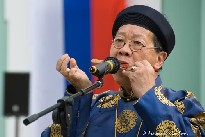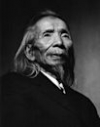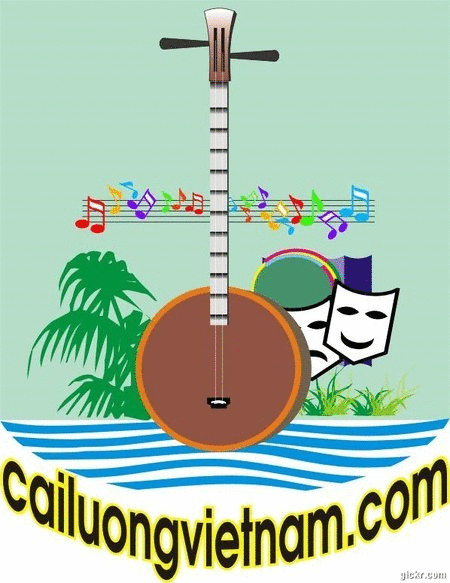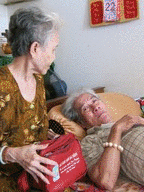•Menu
•Top News
-
 In Memory of Singer Nhật Sơn
In Memory of Singer Nhật Sơn
-
 Gia Bao revealed the reason behind Minh Canh’s invitation to participate in Vietnamese talent promotion
Gia Bao revealed the reason behind Minh Canh’s invitation to participate in Vietnamese talent promotion
-
 “First famous vocalist” Minh Canh 86 years old: How is your health and voice?
“First famous vocalist” Minh Canh 86 years old: How is your health and voice?
- Japanese artist: Why are Vietnamese people so kind and beautiful?
- 2023 Ca Mau Southern Folk Cake Festival opens
-
 Artist Minh Canh suddenly has a second live show
Artist Minh Canh suddenly has a second live show
-
 After Decades Under the Bed, a 1974 Vietnamese Film Finds an Audience Online
After Decades Under the Bed, a 1974 Vietnamese Film Finds an Audience Online
-
 Artist Kieu Phuong Loan is surprised to see her image 35 years ago
Artist Kieu Phuong Loan is surprised to see her image 35 years ago
- 5.000 Vietnamese studying in France: What's new in visa and scholarship policies in 2024?
-
 Doan Minh Tai looks like a gentleman, wearing a Mon Amie suit
Doan Minh Tai looks like a gentleman, wearing a Mon Amie suit
•Random News
•Counter
![]() Online :
15
Online :
15
![]() Today :
3279
Today :
3279
![]() This month
: 84904
This month
: 84904
![]() Total : 2628851
Total : 2628851
 »
News
»
Stars
»
News
»
Stars

Vietnam's banh mi named world's most delicious sandwich
ietnamese banh mi (baguette) has been ranked first in the list of the top 100 sandwiches in the world by international food website Taste Atlas.
Professor returns to VN to share music
Posted at: TUEsday - 12/05/2015 11:17 - Viewed: 2183
Professor Tran Quang Hai
Hai was born in 1944, to a family of five generations of musicians. He studied at the National Conservatory of Music in HCM City before going to France in 1961. Since 1966, he has performed in 70 countries and taken part in more than one hundred international traditional music festivals. The music master has also given talks on Vietnamese music in 65 countries and taught Asian music at 120 universities around the world.
Could you say something about the collection of music documents and CDs you granted to the Viet Nam Institute of Musicology?
Trân Quang Hai : I have collected books, newspaper articles, CDs and DVDs on the traditional music of many countries during my 40 years in France. The collection includes more than 1,000 books, thousands of CDs and DVDs, some magazines and about 100 traditional musical instruments from different countries. I can't estimate their worth, but I have spent nearly my whole life collecting and studying them. I think they will be useful for the VIM (Vietnamese Institute for Musicology) in its research about the traditional music of different world groups. Many of the documents make particular mention of ethnomusicology, the teaching methods for music, which is an urgent problem for preserving music in Viet Nam.
Aware of my intentions, my father, Professor Tran Van Khe, wrote me a letter. He wrote that he wouldn't be able to attend the granting ceremony at the VIM ( Vietnamese Institute for Musicology) but he felt proud and happy concerning my decision. He donated his own collection of musical documents to the HCM City.
You went to France in 1961 to study violin at the National Conversatory of Music and musicology at Sorbonne University. Why do you continue to follow Vietnamese traditional music?
Trân Quang Hai : At first, I wanted to be one of the world's most outstanding violinists. However,maestro Yehudi Menuhin told me France didn't really need a Vietnamese violin player because there were already thousands of violinists there. What they did need was a master musician who had a knowledge of traditional Vietnamese music. His words made sense and I decided to study the music of my homeland with my father who transmitted to me all he knew about Vietnamese and Asian musics.
You have been a member of the International Council for Traditional Music (ICTM)'s executive board since 2005. You are the third Vietnamese to hold a position on the board. Does it help you spend time on Vietnamese music?
Trân Quang Hai : I went to France but I always think about Viet Nam. Viet Nam is always in my heart. No matter where I go, I will always return to Viet Nam and devote my life to Vietnamese music, like my father.
As an executive board member of ICTM, I have a chance to help other Vietnamese researchers join the council and can help foreign researchers learn about Viet Nam and visit the country.
Together with other Vietnamese scholars and researchers, I suggested that Viet Nam could be used as a venue for two ICTM study group symposia.
How did you do that? Did you help organise the symposia in Viet Nam?
Trân Quang Hai : When my father was vice president and Professor To Ngoc Thanh was a member of ICTM's executive board, Viet Nam was considered as a possible venue for symposium but the conditions in Viet Nam were not good enough at that time.
I joined the executive board in 2005 and had a chance to show the members of the executive board of the ICTM that Viet Nam has a wonderful landscape, outstanding culture, long-standing traditions and fine cuisine, and could be a good venue for ICTM activities.
Viet Nam's economy and culture have developed. I had discussions with other executive board members of the ICTM and suggested that we should get out of Europe. I mentioned that Viet Nam has 54 ethnic groups, each one with its own cultural and musical characteristics. The Music and Minorities, and the Applied Ethnomusicology groups could discover their similarities and differences when studying the music of Vietnamese ethnic groups.
This is the first time the ICTM's symposia have been organised in a country outside of Europe, and the first time two study groups have organised their joint symposia together.
Last year with 29 november 2009 as dead line, the delegates were asked to submit their papers in case of a change in venue.
After surveys of the venues and delegate accommodations by Prof. Dr. Svanibor Pettan in February 2010, it was confirmed that Viet Nam was capable of hosting the symposia.
Do you have any comments on the results of the symposia?
They were beyond any one's imagination. Sessions were held on boats. Delegates had 2 joint sessions while travelling around the World Natural Heritage site recognised by UNESCO. They were very excited.
Through the symposia, they learned more about Vietnamese traditional ethnic music and were able to compare music between different ethnic groups.
All delegates expressed the idea that the symposia in Viet Nam will be considered a model and a prime example for other ICTM activities in the future. They said they were surprised by the beautiful Vietnamese landscape and the friendly people. They said when they returned to their countries they would promote Viet Nam among their people.
The ICTM symposia organised in Viet Nam helped foreign scholars to know more about the Vietnamese traditional music. Do you have any recommendations to popularise Vietnamese music abroad?
Trân Quang Hai : It can't be denied that Viet Nam had an exceptional opportunity to introduce its music to the world, but I think we should be more active. Large scale international conferences like ICTM's symposia won't take place all the time.
Vietnamese musicians shouldn't sit and wait for international researchers to come study about Vietnamese music. We should open the door to encourage them to come.
Vietnamese specialists should learn foreign languages to facilitate exchange with foreign colleagues. Seventy per cent of the collection I donated to the Vietnamese Institute for Musicology is in English.
I suggest that Vietnamese researchers should translate their studies on Vietnamese music into English and send them to important foreign traditional music magazines. When the articles are published, Vietnamese music will be recognised and appreciated much more .
As I said before, 54 ethnic groups in Viet Nam have similarities and differences in their traditional music so they should learn from each other to strengthen mutual understanding.
Young Vietnamese should learn about traditional music in school. Little by little, after 12-years of general education, they will have a basic knowledge on the traditional music of their ancestors and neighbouring groups of people and are proud of exchanging with foreign friends about the beauty of their traditional music without any inferior complex when they are abroad to study or to participate in international conferences . — VNSSource: tcgd theo tranquanghai.info
Newer articles
- Vietnamese comedian’s theater keeps going, ten days after his arrest in US (04/04/2016)
- FAREWELL PEOPLE’S ARTIST THANH TONG: A STAR HAS FALLEN … (29/11/2016)
- Nam Cuong invited Phuong My Chi and staged live concert 10 years singing (26/06/2018)
- Cai luong veteran actress celebrates her birthday with a special performance (13/08/2018)
- Pham Huong on announcement of wrong Miss Universe winner (03/01/2016)
- Northern Cai Luong inspires southern audience (17/12/2015)
- Actor Omar Sharif, star of 'Doctor Zhivago', dead at 83 (15/07/2015)
- Cai luong legend comes to life in photos (18/08/2015)
- Actor Viet Hung (15/10/2015)
- Actress Thanh Thanh Hoa – The Gold Medalist of the Prestigious Thanh Tam Award in 1961 (23/06/2015)
Older articles
- Trieu Trung Kien (03/05/2015)
- Remembering one of the greatest actors in Cai luong arts – the People’s Artist (NSND) Ut Tra On (19/03/2015)
- Actor Viet Hung (06/03/2015)
- Le Thuy – 45-Year Career in Performing (01/03/2015)
•GO TO...
•Hot News
-
 Vietnam's banh mi named world's most delicious sandwich
Vietnam's banh mi named world's most delicious sandwich
-
 HCMC student accepted to 16 US universities
HCMC student accepted to 16 US universities
-
 Over 21,000 tourists visit Huong Pagoda on ticket sales' first day for festival
Over 21,000 tourists visit Huong Pagoda on ticket sales' first day for festival
-
 One more Vietnamese singer appears in Times Square in New York
One more Vietnamese singer appears in Times Square in New York
- Youth’s Tet festival to return to HCMC
-
 Annual Book Street Festival 2024 on Tet holiday to open on February 7
Annual Book Street Festival 2024 on Tet holiday to open on February 7
-
 Don Ca Tai Tu Nam Bo Festival 2023 opens in Bac Lieu
Don Ca Tai Tu Nam Bo Festival 2023 opens in Bac Lieu
-
 Who is the youngest female Cai Luong artist to be awarded People's Artist?
Who is the youngest female Cai Luong artist to be awarded People's Artist?
-
 Legendary cai luong singer Thanh Duoc passes away in US
Legendary cai luong singer Thanh Duoc passes away in US
-
 Concert to mark 100th birthday anniversary of great composer Van Cao
Concert to mark 100th birthday anniversary of great composer Van Cao
- Japanese artist: Why are Vietnamese people so kind and beautiful?
- 5.000 Vietnamese studying in France: What's new in visa and scholarship policies in 2024?
-
 Doan Minh Tai looks like a gentleman, wearing a Mon Amie suit
Doan Minh Tai looks like a gentleman, wearing a Mon Amie suit
-
 Artist Kieu Phuong Loan is surprised to see her image 35 years ago
Artist Kieu Phuong Loan is surprised to see her image 35 years ago
-
 In Memory of Singer Nhật Sơn
In Memory of Singer Nhật Sơn
-
 After Decades Under the Bed, a 1974 Vietnamese Film Finds an Audience Online
After Decades Under the Bed, a 1974 Vietnamese Film Finds an Audience Online
-
 Artist Minh Canh suddenly has a second live show
Artist Minh Canh suddenly has a second live show
-
 Gia Bao revealed the reason behind Minh Canh’s invitation to participate in Vietnamese talent promotion
Gia Bao revealed the reason behind Minh Canh’s invitation to participate in Vietnamese talent promotion
-
 “First famous vocalist” Minh Canh 86 years old: How is your health and voice?
“First famous vocalist” Minh Canh 86 years old: How is your health and voice?
- 2023 Ca Mau Southern Folk Cake Festival opens










Reader Comments